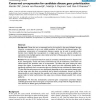Free Online Productivity Tools
i2Speak
i2Symbol
i2OCR
iTex2Img
iWeb2Print
iWeb2Shot
i2Type
iPdf2Split
iPdf2Merge
i2Bopomofo
i2Arabic
i2Style
i2Image
i2PDF
iLatex2Rtf
Sci2ools
97
Voted
BMCBI
2008
2008
Conserved co-expression for candidate disease gene prioritization
Background: Genes that are co-expressed tend to be involved in the same biological process. However, co-expression is not a very reliable predictor of functional links between genes. The evolutionary conservation of co-expression between species can be used to predict protein function more reliably than co-expression in a single species. Here we examine whether coexpression across multiple species is also a better prioritizer of disease genes than is co-expression between human genes alone. Results: We use co-expression data from yeast (S. cerevisiae), nematode worm (C. elegans), fruit fly (D. melanogaster), mouse and human and find that the use of evolutionary conservation can indeed improve the predictive value of co-expression. The effect that genes causing the same disease have higher co-expression than do other genes from their associated disease loci, is significantly enhanced when co-expression data are combined across evolutionarily distant species. We also find that performan...
Related Content
| Added | 09 Dec 2010 |
| Updated | 09 Dec 2010 |
| Type | Journal |
| Year | 2008 |
| Where | BMCBI |
| Authors | Martin Oti, Jeroen van Reeuwijk, Martijn A. Huynen, Han G. Brunner |
Comments (0)

